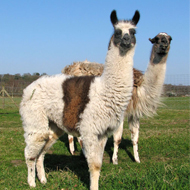
Government consult over new camelids statutory scheme
A new compensation scheme for farmers whose llamas or alpacas are suspected of being infected with TB, could be introduced by the Government.
A consultation over a statutory compensation scheme for TB infected camelids, is currently being held by DEFRA.
It said the new scheme would replace current slaughter arrangements, which were introduced as a temporary measure six years ago, and which see a payment made to camelid keepers for the removal of animals that are suspected to be infected with TB.
The consultation over the new scheme is taking place as part of a wider proposal to consolidate three existing TB deer orders, to make it easier for English deer farmers and veterinary surgeons to understand what is required if a herd is affected.
"There is an ongoing need to remove animals suspected of having TB in order to prevent the spread of this disease that can devastate small businesses.
"This consolidation of the deer Orders provides an opportunity to establish statutory compensation and to introduce other measures where camelids are tested positive or suspected of TB," said a DEFRA spokesman.
DEFRA said research had shown that a tuberculin skin test on camelids is only moderately successful in detecting animals infected with the bTB.
It said detection of the bacteria can be dramatically increased through two antibody blood tests. Proposal inlude administrative changes for these tests of TB-infected camelid herds and other at-risk herds.
The full consultation document is available to view and complete online



 The latest
The latest